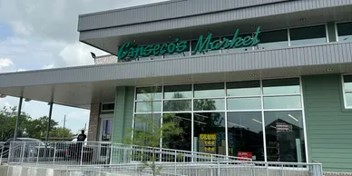Hope Credit Union ($560.4M, Jackson, MS) has helped prevent a food desert from forming in one of New Orleans’ most populous areas, but cooperative leaders far beyond the Gulf can learn a lesson or two from the credit union.
The Louisiana-based grocery store chain Canseco’s Market operates five locations in and around New Orleans. Several years ago, it considered closing its Seventh Ward location; however, that loss risked leaving the Ward’s nearly 20,000 residents with insufficient access to affordable, healthy foods, which could have had a devastating effect on the largely impoverished community’s physical and economic health.

That’s where Hope stepped in.
Thanks to the Fresh Food Retail Initiative (FFRI) — a citywide program to encourage grocery store development in low-income, underserved communities throughout Orleans Parish — and a partnership with the City of New Orleans, Hope secured funds to keep Cansecos’s in the Seventh Ward. Kathy Saloy, a senior vice president at Hope Enterprise Corporation, says the credit union’s CDFI status enabled it to not only lend money but also administer relief funds that had been carved out following Hurricane Katrina in 2005.
The credit union industry has undertaken a widespread effort to combat inequality. Cooperatives are preventing banking deserts as well as fighting food deserts. Learn more in “Banking Desert? Not So Fast, Says Great Lakes Credit Union.”
Duck Out Or Double Down?
Canseco’s Seventh Ward market was a beloved neighborhood fixture that enjoyed a stellar brand reputation; however, a larger location was needed to maintain a sufficient inventory of high quality, healthy, and affordable food options. If the market closed, residents would have to travel up to 20 miles — perhaps as far as the French Quarter — to find a full-service grocery store, Saloy says. That’s not exactly within walking distance for ward residents with limited transportation options. But with a loan from Hope, Canesco’s purchased land across the street to build a bigger, better store.

“The funds we gave Canseco’s went toward new equipment and inventory,” Saloy says. “We offered low interest, flexible financing terms, and monetary incentives to keep them in the neighborhood. It was important they stay here.”
When making the loan, Hope considered traditional underwriting criteria as well as broader factors. For example, easy access to nutritious fresh food is an overwhelming root cause of health disparities in New Orleans. Also, grocery stores don’t typically flock to low-income neighborhoods.
None of this is unfamiliar territory for Hope — the credit union has conducted task forces to study communities throughout the city since the aftermath of Hurricane Katrina nearly two decades ago.
A Helping Hand
The citywide FFRI program encourages grocery store development in underserved communities and is partly funded by Disaster Community Block Grants from the federal government. By providing financing for capital, real estate, and related expenses, the program enables eligible operators to open, renovate, or expand retail outlets that sell fresh fruits and vegetables.
CU QUICK FACTS
HOPE CREDIT UNION
DATA AS OF 09.30.23
HQ: Jackson, MS
ASSETS: $570.3M
MEMBERS: 39,267
BRANCHES: 23
EMPLOYEES:236
NET WORTH: 26.5%
ROA:0.04%
The intent is to provide traditionally underserved neighborhoods in New Orleans better access to fresh foods, employment for residents, and opportunities for community revitalization. The program is supported by the City of New Orleans and administered by Hope Enterprise Corporation in partnership with The Food Trust (TFT).
Disaster-relief funds set aside for healthy food programs and grocery stores in underserved areas means some loan forgiveness is available to Canseco’s. However, these loans to grocers come with strict requirements for eligibility. Operators must be experienced — no startups — and prove they can provide at least 24 linear feet of shelf space for fresh fruits and veggies to combat health disparities within communities. Additionally, grocers must show they maintain a quality inventory at all times and are committed to creating jobs to help revitalize the economic health of their neighborhoods.
Canseco’s is self-sustaining. Stores are profitable despite being in a low-margin business in low-income neighborhoods. Plus, Canseco’s prices items competitively and promotes weekly sales on social media.
“I hear people saying, ‘Oh, you need to go to Canseco’s because they have crab meat on sale,’” Saloy says.
Lessons Learned
Insights from Canseco’s Market offer a deeper understanding of what it takes to make a meaningful difference in the community.
- Understand community needs and make community health part of the credit union mission.
- Offer flexible financing options to attract business investment in community health.
- Offer residents employment opportunities in a business that makes a difference in their daily lives and that of their neighbors.
- Understand better health stems from better nutrition.
- Advocate at the state level so politicians understand the importance of assistance for underserved communities.
Advice For Credit Unions
Hope’s leaders knew the cooperative couldn’t tackle this challenge alone, Saloy says. So, the credit union established partnerships and pursued grant dollars from other agencies.
“When we partnered with the state of Louisiana and the city of New Orleans, the dollars started coming,” the SVP says.
Saloy adds that two major credit union industry priorities — preventing banking deserts and food deserts — share many commonalties.
“The underbanked — those without a savings, checking account or access to credit — often come from the same population as those in need of better health options,” Saloy says.
She encourages credit unions to establish a presence, however small, in locations that have a connection to their mission. Hope maintains a branch space inside a health care center and has installed an ATM in another popular New Orleans supermarket.
Those efforts are part of a broader mission to bring the underbanked into the credit union fold.
“We want to be the preferred financial institution in every project we pursue,” Saloy says.
The Forecast Calls For Expansion
Hope continues to use its CDFI status to support funding for initiatives in other regions in which it has a presence. It has made several loans to healthy food businesses in Alabama, and in 2024, leaders expect to see responses to applications for funds to support healthy food businesses in other areas as well.
“We will continue to pursue additional funding so we can be a resource and benefactor to other communities,” Saloy says.
It’s Time To Do Well While Doing Good
Join the hundreds of credit union leaders who have completed this course about how putting purpose first is a strategy-altering lens to aid in making unprecedented decisions that impact their employees, members, and communities.
REGISTER TODAY
